 Petzlover
Petzlover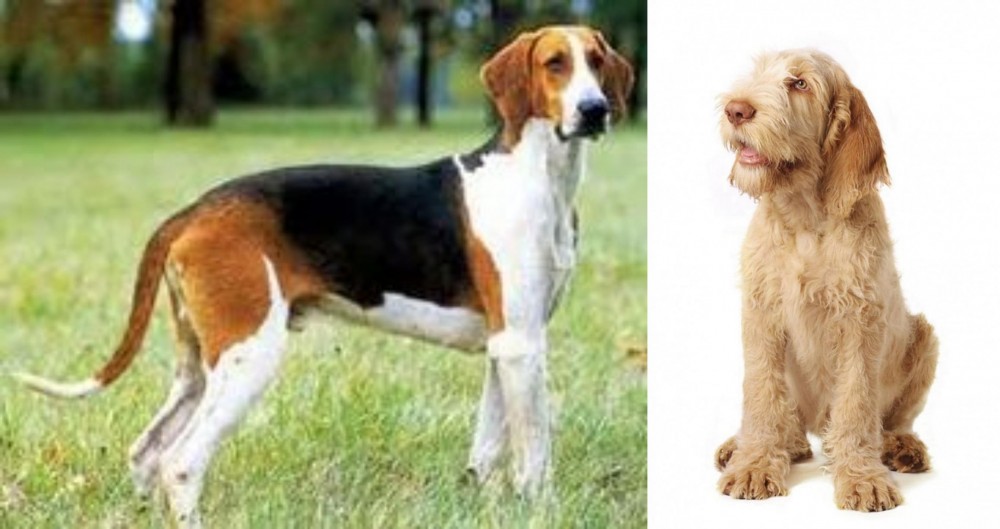 Grand Anglo-Francais Tricolore is originated from France but Spinone Italiano is originated from Italy. Both Grand Anglo-Francais Tricolore and Spinone Italiano are of same height. Both Grand Anglo-Francais Tricolore and Spinone Italiano are having almost same weight. Grand Anglo-Francais Tricolore may live 4 years more than Spinone Italiano. Grand Anglo-Francais Tricolore may have less litter size than Spinone Italiano. Grand Anglo-Francais Tricolore requires Low Maintenance. But Spinone Italiano requires Moderate Maintenance
Grand Anglo-Francais Tricolore is originated from France but Spinone Italiano is originated from Italy. Both Grand Anglo-Francais Tricolore and Spinone Italiano are of same height. Both Grand Anglo-Francais Tricolore and Spinone Italiano are having almost same weight. Grand Anglo-Francais Tricolore may live 4 years more than Spinone Italiano. Grand Anglo-Francais Tricolore may have less litter size than Spinone Italiano. Grand Anglo-Francais Tricolore requires Low Maintenance. But Spinone Italiano requires Moderate Maintenance
 Originating in France, the Grand Anglo-Francais Tricolore has been recognized by the United Kennel Club in 2006. He was developed in France in the 1800s.
Originating in France, the Grand Anglo-Francais Tricolore has been recognized by the United Kennel Club in 2006. He was developed in France in the 1800s.
He is a rare breed, even in France. Today he is essentially a hunting- and scentdog and isn't really kept as a companion pet. The breed is recognized in France too by the French Kennel Club and also recognized internationally in 1983. In France today the dog is bred and kept primarily as a hunting dog and pet combined.
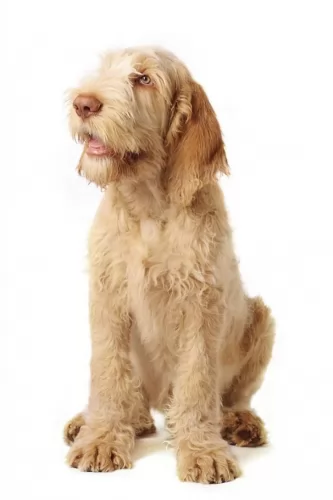 This Italian breed has an ancient blood line tracing all the back to 500 BC. Originally bred to hunt, he is today a friendly, alert and loyal companion. He is intelligent enough to do any job you give him. The Spinone is thought to be one of the oldest gun dogs ever, but it is not entirely clear that he came from Italy. There are some who think he may have come from somewhere in these European countries – Italy, Greece, France, Celtic Ireland, Spain or Russia. However, most believe the breed came from Italy in the Piedmont area.
This Italian breed has an ancient blood line tracing all the back to 500 BC. Originally bred to hunt, he is today a friendly, alert and loyal companion. He is intelligent enough to do any job you give him. The Spinone is thought to be one of the oldest gun dogs ever, but it is not entirely clear that he came from Italy. There are some who think he may have come from somewhere in these European countries – Italy, Greece, France, Celtic Ireland, Spain or Russia. However, most believe the breed came from Italy in the Piedmont area.
The most common thinking is that he is a descendent of the Spanish Pointer and/or the Russian Setter. One other theory is that setters from Greece were brought to the Roman Empire and crossed with a variety of Italian dog to make the coarse haired Spinone we see today. Then the French put in their claim that the breed is a cross of many French pointers.
The theory that counts might just belong to the Italians who believe the ancestor to the Spinone includes the German Wirehaired Pointer, the Pudelpointer and the Wirehaired Pointer. It was not until the 19th century that the name Spinone was officially given to the breed.
Before that it might have been known as a Spinoso and named after a thorn bus in Italy called the Spino. This bush was so thick and sharp that small prey animals learned to hide under it because the predators could not get through it. The Spinone however was able to fight through the briars with its thick, coarse hair and tough skin.
The breed almost became extinct during the second world war as before and after the hunters in Italy had started to use other breeds for hunting. Breeders also began to cross the Spinone with wire hairs like German Wirehaired Pointer, the Wirehaired Pointing Griffon and the Boulet.
The most popular hunting dog in Italy today is the Bracco Italiano while the Spinone is still used for hunting.
 Looking quite a bit like its Foxhound ancestors,the muscular Grand Anglo-Francais Tricolore is a large dog standing at 60cm to 70cm tall at the withers and weighing in the region of 30kg and 35kg.
Looking quite a bit like its Foxhound ancestors,the muscular Grand Anglo-Francais Tricolore is a large dog standing at 60cm to 70cm tall at the withers and weighing in the region of 30kg and 35kg.
The Tricolore has a fairly broad, flat head, black nose and large brown eyes. His ears are set at eye level, they are medium length and floppy. The legs of the dog are straight and strong and the chest is deep and broad. The tail is long and slim. His double coat coat is short and smooth and he is tri-colored – tan, white and black.
Your Grand Anglo-Francais Tricolore has always been used as a hunting dog and scenthound and has been used in a hunting team. The dog has been created by crossing French scenthounds with English Foxhounds, with this particular dog being descended from crosses between the Foxhound and the tricoloured Poitevins.
There are actually 3 Grand Anglo-Français breeds, with this Grand Anglo-Français Tricolore being one. He is a docile dog and doesn't make a particularly good watchdog. The dog enjoys the company of other canines and while he can get on well with his human family, and is good and patient with children, he isn't the ideal pet with children, as his mind is on hunting and the chase and following exciting scents.
He is a dog totally dedicated to hunting and hunting in packs sees him getting on well in the presence of other dogs. His strong hunting instinct and his wish to roam on a scent makes it that he will require a very large garden.
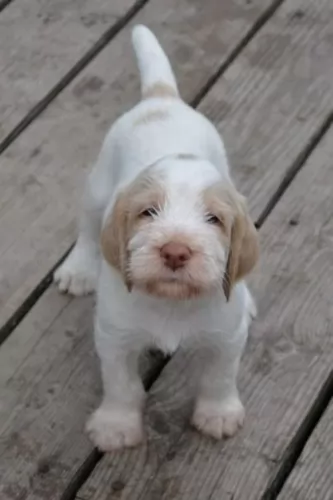 The breed is made up of strong, solid and muscled dogs that have an almost square build. His legs are made to travel any terrain and his head is long with an occipital that is pronounced and unique to the Spinone. They are said to have “human appearing eyes”, with a docked tail in countries allowing it and webbed paws.
The breed is made up of strong, solid and muscled dogs that have an almost square build. His legs are made to travel any terrain and his head is long with an occipital that is pronounced and unique to the Spinone. They are said to have “human appearing eyes”, with a docked tail in countries allowing it and webbed paws.
Shorter hair covers their feet, head, legs, muzzle and ears. They have longer hair on their eyebrows and it is stiff, with soft hair on the muzzle and cheeks with a beard and mustache. It is a single coated dog though the coat is rough. They should have skin, lips, nose, and pads in colors that coordinate with their coats. For white dog it is a red-orange color, brown in dogs that are roan colored and dark red-orange in the orange and white colored dog.
 The Tricolore is an excellent hunter but he also makes a good family pet. Because of the dog having ingrained hunting skills you won't find him being used essentially as a pet.
The Tricolore is an excellent hunter but he also makes a good family pet. Because of the dog having ingrained hunting skills you won't find him being used essentially as a pet.
He can be stubborn, but with training and socialization he can become obedient and amicable. He is a dog that will require a great deal of exercise as he is an exuberant dog and won't do well in an environment where there is scant regard to outdoor living and exercise.
While hunting is a great love of this tri-colored dog, he is also capable of being a loving and devoted pet.
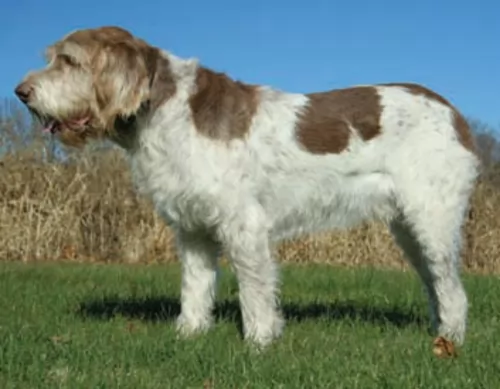 3.Adaptability – Young dogs need a lot of attention but they don’t need a lot of space. The young dogs are energetic while the adult dogs are laid-back. They need exercise every day and at least a small back yard.
3.Adaptability – Young dogs need a lot of attention but they don’t need a lot of space. The young dogs are energetic while the adult dogs are laid-back. They need exercise every day and at least a small back yard.
 Living to be about 10-13 years of age, your Grand Anglo-Français Tricolore is fortunate to be a healthy dog, but just like many other dogs, he may well get sick and then, as a responsible dog owner, you need to get your 4-legged family member to the vet.
Living to be about 10-13 years of age, your Grand Anglo-Français Tricolore is fortunate to be a healthy dog, but just like many other dogs, he may well get sick and then, as a responsible dog owner, you need to get your 4-legged family member to the vet.
An abnormal hip joint can be hard for your dog as you notice him becoming less active and battling to get up after lying down. Hip dysplasia can lead to osteoarthritis, a limp and lameness. Get him to the vet so that you can at least help with making your pet's problem easier to bear.
Typically with deep chested dogs, the Grand Anglo-Français Tricolore can develop the life-threatening problem of bloat, when the stomach twists.
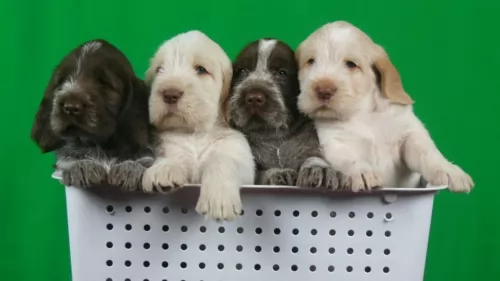 This is an ancient breed with not a lot of documented genetic issues, but it does have one deadly condition.
This is an ancient breed with not a lot of documented genetic issues, but it does have one deadly condition.
• Cerebellar ataxia (CA) is inherited and hits the puppies. Because it is a recessive gene both the mother and father must carry it for the puppy to inherit it. This makes it less likely than it would be otherwise. Puppies with the condition do not live more than a year. Since it is a genetic problem there is now a test for it that identifies carriers at a 95% accuracy rate.
• Like many other large breed dogs, they are susceptible to hip dysplasia. This can cause arthritis and/or lameness. There are now hip replacement surgeries available for this condition.
• Bloat is again common in large dogs and you need to watch for it with the Spinone. It can be deadly if not treated immediately. Let your dog rest quietly after eating. Do not let her exercise or play energetically after eating.
 The exercise requirements of this breed are high and he thrives on being busy and being involved in a hunt. If you do happen to keep him as a pet, he will require plenty of intense exercise from going on walks to joining in with your jogging and cycling activities. He just never seems to get enough exercise.
The exercise requirements of this breed are high and he thrives on being busy and being involved in a hunt. If you do happen to keep him as a pet, he will require plenty of intense exercise from going on walks to joining in with your jogging and cycling activities. He just never seems to get enough exercise.
The Grand Anglo-Français Tricolore requires little grooming and will do well with a good brushing twice a week to remove loose hairs.
For your Grand Anglo-Français Tricolore to be strong and healthy, he'll need protein for strong bones and muscles.Protein needs to be the primary ingredient in an active dog's diet. If you're not sure, ask your vet about the best kibble to feed him and add in some raw meat to this every now and then.
Where possible, cooked brown rice, vegetables and chicken can be added into the kibble too to make his diet more interesting and healthy. Fresh, cool water should be reachable for your dog 24/7.
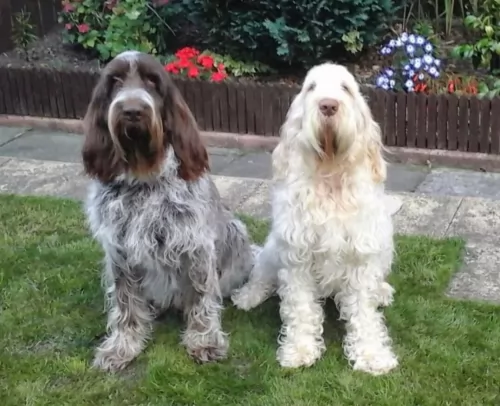 1Feeding the puppy – feed a high quality dog food for puppies of large breeds. Feed 3-4x day but don’t overfeed or let him exercise after eating even as a puppy.
1Feeding the puppy – feed a high quality dog food for puppies of large breeds. Feed 3-4x day but don’t overfeed or let him exercise after eating even as a puppy.
2.Feeding the adult - feed a high quality dog food for large breeds. Feed 1-2X day but don’t overfeed or let him exercise after eating.
4. Games and Exercises – The Spinone is an active breed, but not a fast dog. In fact, they like to travel at a trot so it becomes a great dog for jogging or running with. They love to jump, track, hunt, hike. They do well with agility, retrieving, flyball, carting, being a therapy dog, a rescue dog and a watchdog.